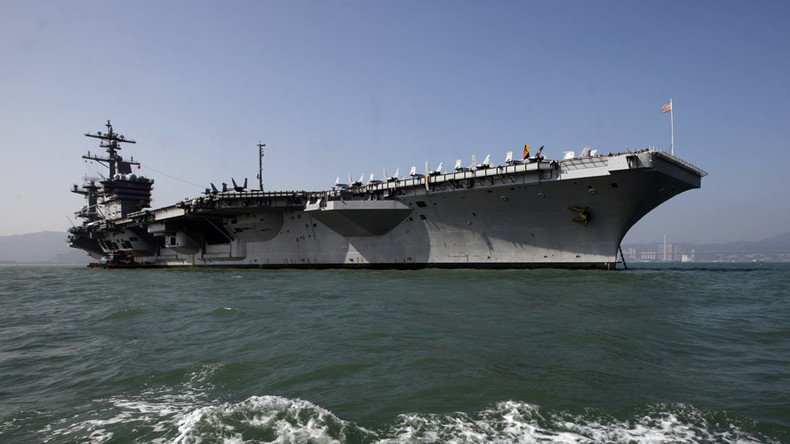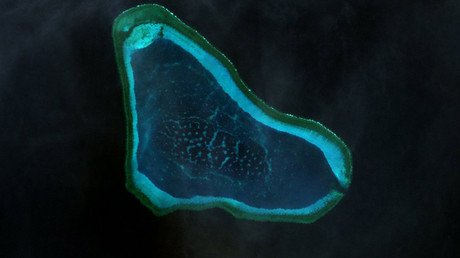US to sharpen ‘military edge’ in Asia Pacific with more subs, undersea drones – Pentagon chief

The United States aims to “sharpen its military edge” in Asia Pacific with modernized military equipment to “undergird security” in the region and counter China’s rising military might, US Defense Secretary Ash Carter has said.
“The United States will continue to sharpen our military edge so we remain the most powerful military in [Asia Pacific] and the security partner of choice,” Ash Carter pledged on Thursday in a speech aboard the aircraft carrier USS Carl Vinson in San Diego. Carter said the Pentagon will focus its efforts on modernizing its military capabilities in the region, including Air Force modernization of the KC-46A tanker, B-21 bomber and F-35 joint strike fighter. It also plans to invest in undersea drones and advanced torpedoes, the Military Times reports.
Carter added there would be “a few surprises” in the new technological developments as well, but did not specify the details. “I can’t share all the details on these for obvious reasons, but what our friends and our potential adversaries – and all of you – should know is that these new capabilities will help us keep our decades-old commitment to undergirding security in the Asia-Pacific,” the Pentagon chief said.
The aim of all these improvements, Carter said, is to ensure the region “remains a place where every nation can rise and prosper,” even at a time of political, economic, and security changes and challenges. Among these he named North Korea’s “nuclear saber-rattling,” terrorism, transnational threats, and maritime concerns, alluding to China’s claims disputed areas of the South China Sea and Beijing “sometimes behaving aggressively.”
“The United States still has serious concerns with some of China’s recent actions on the seas, in cyberspace, and elsewhere. Beijing sometimes appears to want to pick and choose which principles it wants to benefit from and which it prefers to try to undercut,” Carter pointed out.
“For example, the universal right to freedom of navigation that allows China’s ships and aircraft to transit safely and peacefully is the same right that Beijing criticizes other countries for exercising in the region.” China has been in the spotlight of a number of disputes in the South China Sea, declaring claims on a number of islands and territorial waters as China’s historic property. Even after The Hague’s Arbitration Court waived Beijing’s claims to the Spratly Islands, disputed by the Philippines, Beijing allegedly proceeded to build an artificial island on Scarborough Shoal, northeast of the Spratlys.
Washington repeatedly warned China against reclaiming waters around Scarborough and “flexing muscle” in the region, siding with the Philippines, its crucial regional ally, on the matter. Ash Carter said that the United States will continue to invest in five Philippines military bases, calling the relationship between the two countries “ironclad,” despite the recent rift following insulting remarks by Philippines President Rodrigo Duterte. The two countries are to hold joint military drills in October, which Duterte says will be “the last ones,” fearing they may provoke further tensions with China.
Despite the clash of interests in the South China Sea, Duterte recently threatened to distance his country from the US and form an alliance with China and Russia instead.
“I expect we’ll get through this. The US has a strong security interest in the Philippines,” Ash Carter said on Thursday, as cited by Stars and Stripes.
READ MORE: China warns against US deployment of THAAD anti-missile system in S. Korea
China, in the meantime, has been speaking out against the US expanding its military presence in the region. Earlier this week, the Chinese Defense Ministry warned the US against deploying the Terminal High Altitude Area Defense system in South Korea. Angered by what it regards as the US unbalancing the region, Beijing on Thursday promised to take “necessary actions to protect national strategic security and the regional strategic balance.”
China also warned Tokyo against “playing with fire” and joining US-led naval “patrols” and “exercises” in the South China Sea, after Tokyo announced plans to increase joint military activities with the US to counter Chinese dominance earlier in September.
The US has military bases in at least 74 countries worldwide, including a number of facilities in Asia Pacific. Japan, the Philippines, South Korea, Singapore, and Guam all host American military bases, while US military personnel is also deployed in Thailand.













